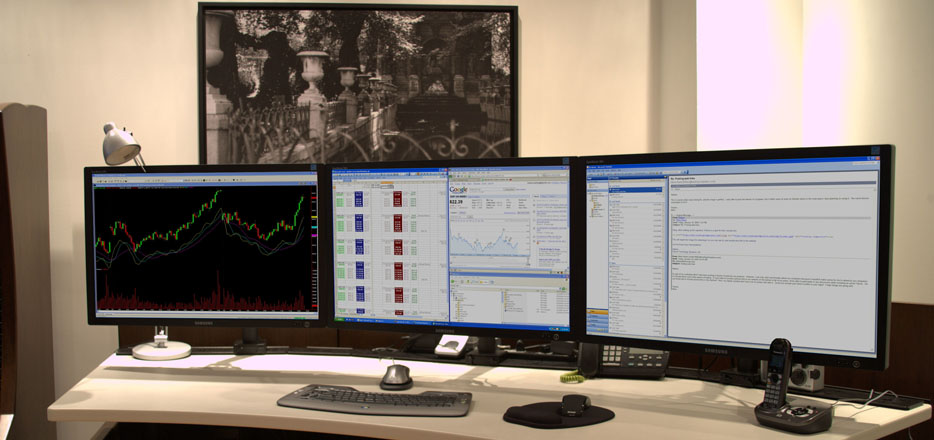 Learn how to trade the way most successful traders that I know have become financially independent.
This guide is the beginning of a series of articles that show you the most common path I know of to
successful trading. There are a lot of people who want you to learn how to trade using their new
discovery of a secret way of trading. I have seen many of these secret trading methods come and
go over the last 14 years which I have been trading. The principals shown here worked 14 years
ago and they work today.
Learn how to trade the way most successful traders that I know have become financially independent.
This guide is the beginning of a series of articles that show you the most common path I know of to
successful trading. There are a lot of people who want you to learn how to trade using their new
discovery of a secret way of trading. I have seen many of these secret trading methods come and
go over the last 14 years which I have been trading. The principals shown here worked 14 years
ago and they work today.
This Learn How to Trade guide is designed to get aspiring traders pointed in the right direction.
It is linked to additional articles on learning how to trade that will continue the journey. Beginning
traders are sometimes dead set in their direction on learning how to trade using the misinformation that
they have acquired from sources other than successful traders. I have been trading for well over a decade
now and I know a number of good traders. The people I meet who are new to trading usually have a lot of
misconceptions about trading that need to be cleared up before they can learn how to trade successfully.
What makes a person successful in trading is setting correct expectations, doing some homework and
practicing the needed skills.
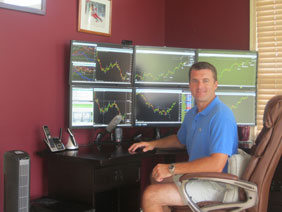
Trading is not gambling although some of the Game Theory mathematics that applies to gambling
can be of some use in trading. Non-professional gamblers will generally not make good traders unless
they approach trading differently than gambling. Professional gamblers sometimes approach gambling
with a careful study of the game they are playing and Game Theory mathematics to get consistent
results; these gamblers can be good traders. Trading may trigger some of the same addictive
reactions that gambling does in some people but not for me. I hate to gamble but I love to trade.
I view most forms of gambling as a waste of money but I view trading like a great game of golf.
When I go to Las Vegas I see a lot of people putting their money on bets without really knowing
much about what they are doing. They are untrained in the proper techniques that are needed to
win at what they are playing. The casinos take their money without much difficulty. If one of
these Las Vegas gamblers turns to science and becomes skilled at it then they will be permanently
thrown out of the casinos. People who approach trading the way they lose money in Las Vegas are
just throwing their money away. Being a trader is being a skilled professional.
However, trading is like being a skilled sports professional rather than a typical skilled
craftsperson. A skilled craftsperson gets it right nearly every time in that his success rate
is near 100%. If you play a professional sport you would not expect to achieve
such high success rates, just having a winning season is often cause for much satisfaction.
Once you know how to trade you can expect to achieve 57-59% winners. However, learning how to
trade is learning how to accept your losses as well, which are 41-43% of your trades. Losing
41-43% of the time is not always easy because the losses are not always distributed
evenly. There are times when you will have nine losers in a row and you still need
to keep your cool and be confident that you know how to trade the next trade. You need
to trade with careful risk management so that when you have a string of sequential
losers you don't blow out your account. We will discuss proper risk management many
times in this how to trade series because it is very important to your ultimate
success. Most people who are unfamiliar with risk management strategies such as the
Kelly Strategy will risk too much. Forty PH.D's were asked to play a gambling
game where they would be guaranteed to win 60% of the time but at the end of 100 rounds
only two had more then they started with because of poor risk management. You
can get everything else right and still lose money unless you manage risk correctly.
Learning how to trade is easier than many highly skilled professions but you will need to do
your homework before you trade real money. Paper trade first and only after you have mastered
paper trading should you slowly transition to real money (mixing some paper and some real).
Paper trading today is done in an electronic simulation environment, not with real paper.
When you trade you must do what needs to be done even though you may not want to do it.
Human instincts are often wrong and you must learn to resist these feelings that will lose
you money. The way probability works is important to trading but is different than your
natural instincts will lead you to believe. The Gambler's fallacy, also known as the
fallacy of the maturity of chances is the belief that your odds improve when an unusual
series of losses occur or that your odds of winning rises when you have a losing streak.
Some slot machine players will prefer slot machines that have not paid out in a while in
the belief that the chance of a payout has now improved. Let's look at a coin flip example:
if you are flipping a coin and you get "heads" four times in a row then your chances of
getting "tails" on the next coin toss has improved. However, each coin toss is an independent
event that is ignorant of every previous coin toss. Since the coin does not remember the
previous string of heads it is not biased in the next toss. If fifty different people toss
a coin in the air eight different times then the probability of at least one person getting
all heads or tails is 32.44%. That person with all heads (or tails) probably had difficulty
accepting the outcome but it is no less probable that the person who had exactly 25 heads
and 25 tails which were evenly distributed.
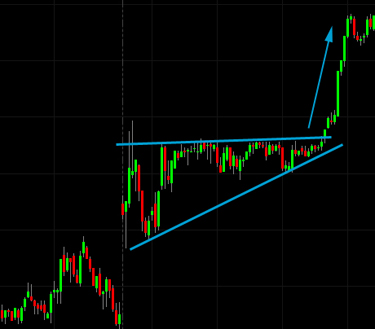
Another example of how human intuition is wrong is the Monte Hall paradox and
Bertrand's box paradox. You are in a game show, and you're given the choice of three
doors: Behind one door is $1,000; behind the others, $1. You pick door No. 1, and the host
(who knows the right answer) opens door No. 3, which has $1. He then says to you, "Do you
want to pick door No. 2?" Should you switch your choice from Door No. 1 to Door No. 2?
Most people would say no because their chance has not seemingly changed and Door No. 2
does not seem to offer any improvement in their chance of winning. People are more
inclined to stay with their choice once made. Staying with your choice leaves you with
a 1/3 chance of winning but changing to door No.2 increases your chances to 2/3. It is
surprising and not at all intuitive but it has been shown to be true (hence the term
"paradox"). As a trader you should learn what is true and re-train yourself to these truths
while avoiding use of your natural human instinct. Why something works in trading is unimportant,
that is an academic exercise for the curious; the fact that it works is all you need to know.
For many people it is hard to exit a losing trade and accept defeat. People who have been
reasonably successful in their life would rather hang in there and work that defeat into a
victory. This is a recipe for disaster in trading. After several disasters the aspiring
trader then over reacts and starts exiting to soon. They want to exit a trade if there is
any loss showing at all because the pain of past disasters puts them in a panic. Knowing
how to trade means limiting your losers and giving your winners room to run (we will
discuss this more later).
For this discussion "being long" means to own a stock, bond, or whatever. If you are "short"
then you have sold it after borrowing it from your broker such that you can
only profit on it if it drops in price.
|
How to trade your Opportunities
At this point I am assuming that you want to learn how to trade so we won't extol the
virtues of the independent private trader. You need to pick what kind of trading you
would like to do. This is very important because you need to match your circumstances
and interests to one or more of the various trading opportunities.
Do not assume that anything you think you know or anything anyone has told you is
accurate, because it often is not with new traders. Carefully weigh each trading
opportunity listed below with an open mind before deciding. People sometimes get
into trading on the wrong instrument or method for their financial situation,
time schedule or personality and then they struggle to make it work.
The instruments of trading
There are four asset classes that are commonly traded:
- Stocks
- Options
- Bonds
- Forex
- Futures
|
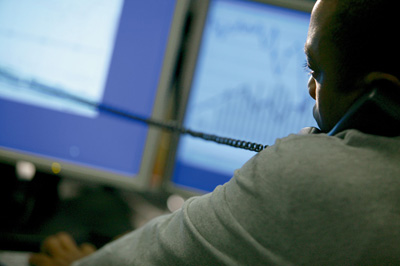
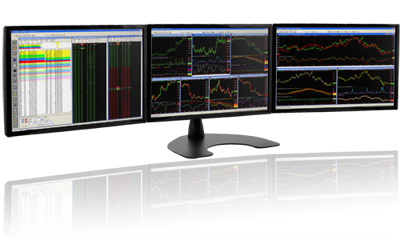
|
Stocks/Shares
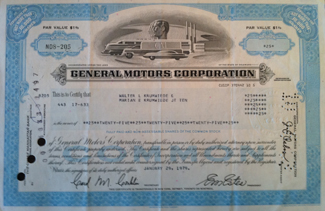 Trading stock shares is the most familiar and most commonly traded of the asset classes. This does not
mean that it is easier or safer or better than the other asset classes to learn how to trade; do not
confuse familiarity with safety or ease. Stocks trade during the Eastern Time business day and in
some cases for a few hours before and after the regular market hours. Part time west coast traders
can usually get a few hours of trading in before going to work due to the time zone differences.
Stocks represent indirect ownership of a business, including the most familiar ones in our
daily life. Do not confuse a good stock with a good trading stock. For trading purposes you
must be emotionally indifferent to the stock; just trade the facts of the situation. Beginning
traders often have a false sense of security when they trade a stock that they have researched
because their stud gives them a more comfortable feeling of familiarity. Familiarity is never
the same as less risk. If you drive a Harley Davidson motorcycle and are in love with it then
do not trade the stock because you are too biased.
Trading stock shares is the most familiar and most commonly traded of the asset classes. This does not
mean that it is easier or safer or better than the other asset classes to learn how to trade; do not
confuse familiarity with safety or ease. Stocks trade during the Eastern Time business day and in
some cases for a few hours before and after the regular market hours. Part time west coast traders
can usually get a few hours of trading in before going to work due to the time zone differences.
Stocks represent indirect ownership of a business, including the most familiar ones in our
daily life. Do not confuse a good stock with a good trading stock. For trading purposes you
must be emotionally indifferent to the stock; just trade the facts of the situation. Beginning
traders often have a false sense of security when they trade a stock that they have researched
because their stud gives them a more comfortable feeling of familiarity. Familiarity is never
the same as less risk. If you drive a Harley Davidson motorcycle and are in love with it then
do not trade the stock because you are too biased.
If you have more than $25,000 to trade then this is probably a good asset for you to begin to
learn how to trade. Stock (and option) trading has the drawback of requiring an account size
of more than $25,000 to trade more than four times in five days in a margin account ("pattern
day trade rule"). To trade you need a margin account or you will need to wait three days after
closing a trade before the the funds are cleared so you can trade again. Even if you hold your
trades for longer periods of time, like weeks at a time, sooner or later you will want to make
more than four trades (entering or exiting trades) within a five day period because stocks tend
to move together 70% of the time and you may need to exit or reverse several positions in your
portfolio in the same week.
A sub-category of stock trading is penny stocks. These are "pink sheet" stocks which are
essentially worthless empty shells. If a stock selling for five cents goes up to fifteen
cents then you could tripled your money. These stocks are worthless and none have ever
emerged (to my knowledge) to become a real company. This market is ruled by pump-and-dump
schemes where someone puts out false information via email/fax spam that some penny stock
is about to take off and become a real stock with some new positive development at the
company. The distributor of this information buys the stock ahead of time and then sells
into the suckers who are reacting to the false news by purchasing the stock.
There are some account related items that you must be aware of if you trade stocks and/or options:
Pattern Day Trade Rule (FINRA rule):
A stock or options trader who executes 4 (or more) day trades in 5 business days in a margin
account with an account size of less than $25,000. Some brokers, like TDAmeritrade, will
enforce a more restrictive limit of 3-in-5 and will apply it to a cash (non-margin) account.
Regulation-T (Federal Reserve rule):
Regulates margin (borrowing from your broker). Normal margin is 50% of th4e liquidation value of
your account. Margin may not be applied to penny stocks (OTCBB) by your broker. Portfolio margin
can give you up to six times the buying power, particularly for selling naked options. Many brokers
do not offer portfolio margin and those that do will place restrictions on experience and account
size (typically for accounts over $100,000).
Free-riding rule (SEC rule):
Cash accounts that re-use uncleared money are in violation of the free-riding rule or may have done
a liquidation violation which may cause his account to be restricted for 90 days if it occurs 3 times
in a year. Stocks take 3 days to clear and options take 1 day to clear. This rule might not be
applied by some brokers on an option trade that is simply a rollout to a later expiration.
Options

Options are very popular and can be very profitable. I recently made $8,000 in four days on some
S&P 500 ETF option trades using just $12,000 of my account balance, but that doesn't happen
very often. My options had lower risk because they were deep in the money and several months out
in expiration. It was a synthetic stock position with a lot more leverage than a normal stock
trade would give me. This is called a stock replacement strategy or a synthetic position
(depending on how it is done). We will discuss this more later. Options can be the most complex
of the assets to trade. Options are based on another asset, like stocks or futures so you need to
understand both the option and it's underlying asset. Its best to learn how to trade options after
you learn how to trade the underlying asset first. Options are also subject to the $25,000 requirement
of the pattern day trade rule.
Bonds
This is an area best left to specialty brokerages. Any one corporate bond issue is thinly traded and
not suitable for independent traders working from home. These bonds should not be confused with US
Treasury bond futures, which are futures contracts -not the bonds themselves (see below). For long
term investors it is better to buy bonds than to buy bond funds. As long as you own a real bond (not
a fund), you will get all your money back with interest (unless they go bankrupt). You may
permanently lose money in a bond fund no matter how long you invest in it.
Forex
Forex trading is the trading of the exchange rate of currency pairs, like the Euro vs. Dollar.
This seems easy to understand and is not subject to the pattern day trade rule so you can open
an account with $100 and start trading tomorrow. However, currency exchange rates change rapidly
and these pairs can cause your trade to swing wildly in value, which I find difficult to trade
successfully. In my unscientific sampling of traders I have found fewer people being successful
with forex than stocks, options, or futures trading. If your trading budget is tight then you
may need to go this route, in which case you need to follow the lead of someone who is successful,
like Todd Gordon of Aspen Trading.
|
Futures
I've saved the best for last. Futures trading is usually the last asset to be considered
by novice traders. I've known people who have traded stocks for more than ten years and
have never seriously considered futures trading. A big part of the reason is that it is
unfamiliar and mysterious to most people. I did not make my first futures trade until
five years after I had started trading stocks and then found that it was a lot easier
than I thought. Like any type of trading, you need to know what you are doing. Futures
trade 24 hours per day from Sunday night to Friday afternoon and are not subject to the
pattern day trade rule.
Tom Grisafi (pictured at right) makes his living trading agricultural futures, primarily
in grains, in his house in Indiana.
|
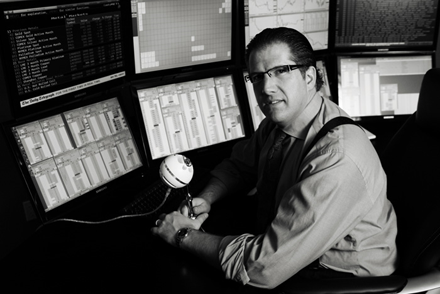
|
Futures are a contract for future delivery. For example, if you own a German car dealership you
can buy a futures contract that will lock in the price of the Euro vs. Dollar for next quarter's
car purchases to protect yourself from an adverse change in the exchange rate. The leverage in
futures contracts is very high so a little money goes a long way. Over use of leverage can lead
to excessive losses (remember the 41-43% of your trades will be losers). Futures contracts can
be had for stocks, stock indexes, commodities (corn, wheat, soybeans, etc.), US Treasury bonds,
and much more. Futures offer a wide range of uncorrelated instruments to trade but caution should
be exercised when holding contracts overnight as their value can change dramatically while you
sleep. Futures contracts are rarely traded outside the United States but foreign investors who
have US trading accounts will kick up the action around 4am Eastern Time. Novice traders often
gravitate to the S&P 500 futures electronic contract (ES), which is not the best choice most
of the time due to the relatively high tick value and narrow daily range (more on this later).
My favorite futures contracts are NQ, YM, EMD, and RUT. I know some traders who swear by the
FDAX (German stock index) but I would have to wake up too early to trade that one.
Scott Tafel is the founder and principle partner in Falcon Trading Systems:
computers for traders.
He has been a trader since 1999. Mr. Tafel spent 27 years working in the Nuclear power industry,
principally as a Nuclear Reactor Operator.
|
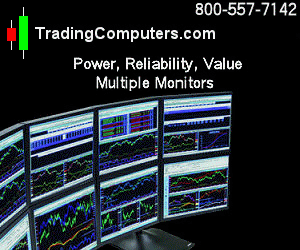
|
|
